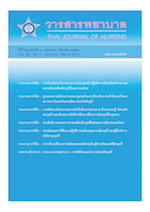ประสิทธิภาพของการช่วยเลิกบุหรี่โดยพยาบาลในประเทศไทย
Main Article Content
Abstract
Effectiveness of nurse managed tobacco cessation program in Thailand.
Srimoragot, P., Sanamthong, P., Chainun, J., Hong-thong, Y., Sawangdee, P., & Auckarawacharangkul, O.
Nurse, one important health professional, has a significant role on providing an effective tobacco cessation service. The objective of this study was to evaluate the effectiveness of an integrated nurse managed tobacco cessation program, including individual and group counseling, behavioral modification, and lay herbal treatment. Sample were 300 smokers who voluntary participated the program which was conducted in 5 hospitals. The 150 experimental participants received the integrated tobacco cessation program based on 5As strategies. The other 150 comparison participants received a conventional care from nurses. Demographic assessment tool, motivation questionnaire, Fagerstorm nicotine addiction test, social support assessment, and quitting outcome were used to examine both at pretest and posttest. Volunteers in both groups had been followed up at least 5 times, after they set the quit date, by telephone call or home visit or OPD visiting at 1 week, and 1,2,4,6 months. Data analysis was performed by using descriptive statistics, Chi-square test, and t-test. Results revealed that smokers in the experimental group had higher quit rate and reduced number of cigarette than those in the comparison group (p < .05). They could maintain high commitment to quit longer than those in the comparison group. Therefore, the effective tobacco cessation should employ integrated strategies, such as Thai herbal medicine and lay knowledge assets. Nurses, especially, in primary care service units, should join a training course to gain their confidence on tobacco cessation service for all Thai smokers.


